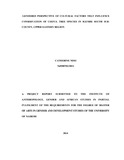| dc.contributor.author | Ndei, Catherine | |
| dc.date.accessioned | 2016-05-03T15:27:17Z | |
| dc.date.available | 2016-05-03T15:27:17Z | |
| dc.date.issued | 2014 | |
| dc.identifier.uri | http://hdl.handle.net/11295/95435 | |
| dc.description.abstract | Gender and cultural beliefs and taboos play an important role in conservation of tree
species on the farm. The socially ascribed gender roles in relation to tree planting
activities and use of tree resources can have significant implications for tree planting. For
instance although women provide labour in planting and managing trees, it is the men
who decide on use and disposal of tree resources. Equally the presence of cultural beliefs
and taboos associated with planting can have an impact on conservation of useful tree
species on the farm as they inhibit conservation of certain tree species.
This study was carried out in Igembe Sub-County and was aimed at assessing cultural
beliefs and taboos that influence conservation of useful tree species by men and women.
The study had three objectives-: to examine the roles of men and women in conservation
of useful trees; to establish the cultural beliefs and taboos that influence men and
women’s participation in agroforestry and to examine how these beliefs have influenced
conservation of useful tree species by women and men.
A cross sectional descriptive research design was used targeting sixty respondents who
included small holder farmers. Data were collected using survey method, key informant
interviews, and focus group discussions. The gender roles framework was used to analyse
gender division of labour in tree conservation.
The study showed that cultural beliefs and taboos have an influence on conservation of
useful trees by men and women. Culturally, planting or cutting of certain tree species is
prohibited and this has helped to conserve some of the endangered indigenous species.
Although these cultural beliefs affect men and women, they are more restrictive to
women when it comes to participation in conservation of trees. Women in most cases
cannot take decisions on issues concerning tree cutting and selling in the community;
male permission is usually sought.
The study recommends the need to sensitize community members on cultural barriers to
conservation of trees by men and women so as to promote gender equity in agroforestry
and to ensure that men and women benefit fully | en_US |
| dc.language.iso | en | en_US |
| dc.publisher | University of Nairobi | en_US |
| dc.rights | Attribution-NonCommercial-NoDerivs 3.0 United States | * |
| dc.rights.uri | http://creativecommons.org/licenses/by-nc-nd/3.0/us/ | * |
| dc.subject | Gendered perspective of Cultural factors | en_US |
| dc.title | Gendered Perspective of Cultural Factors That Influence Conservation of Useful Tree Species in Igembe South Subcounty, Upper Eastern Region | en_US |
| dc.type | Thesis | en_US |



